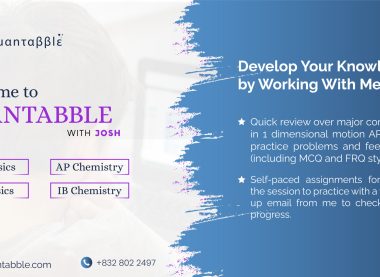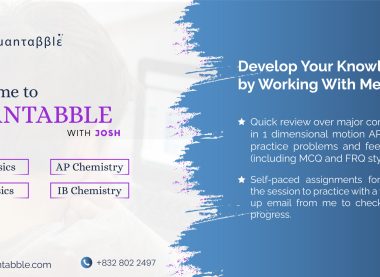Navigating Difficult Content in AP Exams: Strategies for Success
Advanced Placement (AP) exams are renowned for their rigorous and challenging content. As students prepare to demonstrate their proficiency in college-level coursework, grappling with difficult subject matter becomes a crucial aspect of their exam readiness. While exploring the best AP exam courses of 2024, don’t forget the value of personalized tutoring. Quantabble.com offers expert, one-on-one support tailored to your learning style and goals.
Understanding the Complexity of AP Exam Content
AP exams encompass a breadth of intricate and demanding content, designed to reflect college-level material. These exams delve deeply into subjects, requiring comprehensive knowledge, critical thinking, and analytical skills from students.
Challenges Posed by Difficult Content
- Depth and Breadth of Material: AP exams cover extensive subject matter, often encompassing complex theories, historical events, scientific principles, and literary analysis. The depth and breadth of content can overwhelm students, requiring diligent preparation.
- Conceptual Difficulty: Many AP exam questions delve into nuanced concepts that demand a deep understanding rather than rote memorization. Analyzing and applying these concepts in diverse contexts can be challenging.
- Time Constraints: The time constraints of AP exams amplify the difficulty. Students must navigate complex questions within a limited timeframe, necessitating both in-depth knowledge and efficient time management skills.
Strategies for Conquering Difficult Content
- Start Early and Stay Consistent: Begin preparation well in advance to allow for comprehensive coverage of the content. Consistent study habits, including regular review sessions and practice tests, are pivotal for retention and mastery.
- Understand the Exam Format: Familiarize yourself with the exam structure, question types, and scoring rubrics. Understanding the exam’s expectations aids in targeted preparation.
Focus on Conceptual Understanding:
Instead of memorization, prioritize understanding the underlying concepts. Formulate connections between different topics and practice applying concepts to varied scenarios.
- Practice, Practice, Practice: Engage in ample practice tests and questions to acclimate to the exam’s difficulty level. Practice builds familiarity with the format and hones critical thinking skills essential for success.
- Utilize Resources and Seek Help: Leverage study guides, textbooks, online resources, and review sessions provided by educators or tutors. Don’t hesitate to seek clarification or assistance when encountering challenging concepts.
- Time Management Skills: Practice time-bound exercises to refine time management during the exam. Allocate time strategically across sections and questions to ensure coverage and accuracy.
Overcoming Difficulty for Success
Success often emerges from overcoming challenges, and navigating difficult content in AP exams is no exception. Embracing these challenges as opportunities for growth is key. Dedication and resilience play pivotal roles; a mindset shift toward viewing difficulties as avenues for learning fosters perseverance.
Effective study strategies, such as starting early, maintaining consistency, and practicing regularly, form the backbone of conquering tough content. Prioritizing conceptual understanding over rote memorization sharpens analytical skills, enabling students to tackle intricate problems confidently.
Seeking support from resources, educators, and peers when facing hurdles is invaluable. Additionally, refining time management skills through practice helps students navigate the time constraints of the exam effectively.
Ultimately, overcoming difficulty for success in AP exams requires an active engagement with the material, a willingness to seek help when needed, and a commitment to continuous improvement. Embracing the challenge, staying focused on understanding, and employing strategic approaches pave the way for triumph in demonstrating proficiency in complex subject matter.
How Challenging Is It to Pass an AP Exam?
Passing an AP exam entails navigating a challenging assessment that measures a student’s understanding of college-level material. The difficulty of passing varies based on several factors.
Rigor of Content:
AP exams cover extensive and intricate subject matter, often equivalent to introductory college courses. Mastery of complex theories, historical events, scientific principles, or literary analysis is essential. The depth and breadth of content demand thorough preparation.
Exam Format and Expectations:
Understanding the exam format, question types, and scoring criteria is crucial. AP exams assess not only factual knowledge but also critical thinking, analysis, and application of concepts across various contexts. This multifaceted evaluation adds to the challenge.
Time Constraints:
The time limit for AP exams poses an additional challenge. Students must answer multiple-choice and free-response questions within a limited timeframe, requiring swift and accurate problem-solving skills.
Passing Criteria:
To pass an AP exam, students typically need to earn a score of 3 or higher on a 5-point scale. Achieving this score requires a solid grasp of the content and the ability to demonstrate proficiency in the subject matter.
Strategies for Success:
Success in passing an AP exam necessitates consistent study habits, thorough understanding of concepts, regular practice, and effective time management during the exam.
Overall, passing an AP exam is challenging due to the comprehensive content coverage, rigorous assessment, time constraints, and the need for a high level of proficiency. However, with diligent preparation, a solid understanding of the material, and effective exam-taking strategies, students can successfully navigate these challenges and pass their AP exams.
| Exam Name | Passing Rate (3+) | Rate |
| Art and Design: Drawing | 88% | 15% |
| Chinese Language and Culture (Total Group) | 87% | 49% |
| Art and Design: 2-D Design | 87% | 11% |
| Seminar | 83% | 12% |
| Research | 83% | 13% |
| Spanish Language and Culture (Total Group) | 82% | 24% |
| Spanish Language and Culture (Standard Group) | 78% | 16% |
| English Literature and Composition | 78% | 17% |
| Calculus BC | 77% | 41% |
| Japanese Language and Culture (Total Group) | 75% | 49% |
| Art and Design: 3-D Design | 74% | 6% |
| Physics C: Mechanics | 73% | 26% |
| French Language and Culture (Total Group) | 72% | 13% |
| Italian Language and Culture (Total Group) | 71% | 23% |
| Gov. and Politics – Comparative | 71% | 16% |
| Physics 2 | 70% | 16% |
| Physics C: Electricity & Magnetism | 69% | 32% |
| French Language and Culture (Standard Group) | 69% | 8% |
| Computer Science A | 68% | 27% |
| Biology | 68% | 15% |
| Italian Language and Culture (Standard Group) | 66% | 11% |
| German Language and Culture (Total Group) | 66% | 20% |
| Statistics | 61% | 15% |
| Microeconomics | 59% | 18% |
| European History | 59% | 14% |
| German Language and Culture (Standard Group) | 58% | 8% |
| Psychology | 58% | 17% |
| English Language and Composition | 56% | 10% |
| Calculus AB | 56% | 20% |
| Japanese Language and Culture (Standard Group) | 54% | 16% |
| Chemistry | 54% | 13% |
| Environmental Science | 54% | 9% |
| Human Geography | 53% | 15% |
| Macroeconomics | 52% | 16% |
| Physics 1 | 43% | 8% |
Additionally, exams with some of the lowest passing percentages, such as Environmental Science and Human Geography, are often rated as the easiest by students. These examinations have lower passing percentages since they are generally taken by younger high school students who are less prepared for AP exams. Furthermore, many students just undervalue them and do not study sufficiently. As a result, these exams may be simpler to pass; but, you must be prepared to study and should not expect to pass without some effort.
Do you need help studying for your AP exam?
Preparing for an AP exam might be a difficult endeavor, but you don’t have to do it alone. Seeking help while studying for your AP exam might dramatically increase your chances of success. Help is offered for navigating challenging topics, enhancing study tactics, and understanding exam structure.
Educators, tutors, study groups, and a wealth of internet resources provide vital assistance targeted to your specific requirements. Tutors provide personalized attention, answering questions and providing tailored instruction. Study groups promote collaborative learning by allowing for conversation and a variety of viewpoints. To help you prepare, online sites provide practice examinations, review materials, and thorough instructions.






